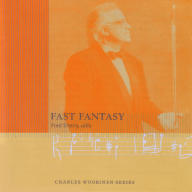Wuorinen was born on June 9, 1938, in New York. He studied at Columbia University, where he worked with Otto Luening, Vladimir Ussachevsky, and Jack Beeson. A major presence in American music for over four decades, Wuorinen taught at numerous schools, including Columbia, Princeton, the New England Conservatory, the Manhattan School of Music, Yale, and SUNY Buffalo, and joined the faculty of Rutgers University in 1984. His awards included the Lili Boulanger Memorial Award, the 1970 Pulitzer Prize (for Time's Encomium), and a McArthur Fellowship in 1985, to name a few.
Wuorinen's music is uniquely serial and primarily 12-tone in nature. His major influences were the modernist European school, namely Schoenberg, though the influence of late Stravinsky and Babbitt is also unmistakable. Much of his music requires extreme virtuosity on the part of the performer, such as his Chamber Concertos, which typically include wide leaps, extreme dynamic contrasts, and rapid exchange of pitches. Fractal geometry and the mathematical theories of Benoit Mandelbrot influenced works such as Bamboula Squared and the Natural Fantasy for organ. However, Wuorinen's later music began to demonstrate tonal relationships, though to a limited degree, such as pitch-centered openings and conclusions, octave doublings, and timbral transpositions of thematic ideas. His music also evolved to include clear rhythmic relationships -- his earlier works avoided this characteristic -- and his melodies also became more conjunct in nature.
Wuorinen's music continued to evolve with later works such as the Rhapsody for Violin and Orchestra and New York Notes containing further rhythmic clarity, more recognizable melodic structures, and clearer orchestration. Clearly, this was not the style of the same composer as was found in his earlier works. In the 1990s, his works included a Piano Quintet (1994) for Ursula Oppens, six scores for the New York City Ballet, and the Fourth String Quartet (1999). In the first decade of the 2000s, James Levine was a supporter of Wuorinen's music. Levine commissioned two concertante works, the premieres of which featured pianist Peter Serkin: the Fourth Piano Concerto (2003) and Time Regained (2008). Other frequent collaborators were cellist Fred Sherry and guitarist William Anderson. Wuorinen wrote the operas Haroun and the Sea of Stories in 2004 and Brokeback Mountain in 2014. The Second Percussion Symphony, premiered in September 2019, was his last completed work. Wuorinen died in New York on March 12, 2020.
Wuorinen was also the author of Simple Composition, a useful text for composers who are beginning to use 12-tone techniques. Wuorinen was also active as a pianist and conducted his own works, as well as those of other contemporary composers, with many major orchestras in the United States. In 1962, Wuorinen co-founded The Group for Contemporary Music, an ensemble dedicated to the performance of new chamber music. With his impressive resume, extremely prolific output, and evolving but unique style, it is sure that Charles Wuorinen will be remembered for his numerous contributions to music, serialism and beyond. ~ Michael Blostein, Rovi













